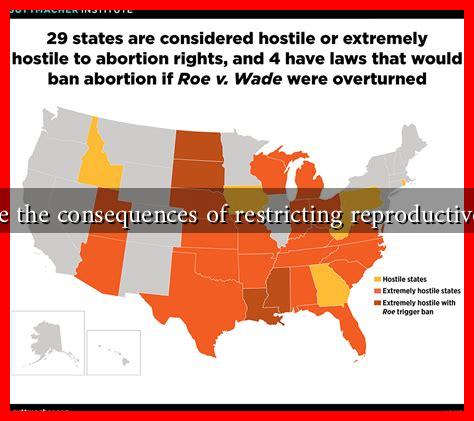-
Table of Contents
What are the Consequences of Restricting Reproductive Rights?
Reproductive rights encompass a range of issues related to the ability of individuals to make informed choices about their reproductive health, including access to contraception, abortion, and comprehensive sex education. The restriction of these rights has far-reaching consequences that affect not only individuals but also families, communities, and society at large. This article explores the multifaceted consequences of restricting reproductive rights, supported by relevant examples and statistics.
Health Implications
One of the most immediate consequences of restricting reproductive rights is the impact on health. When access to safe and legal abortion is limited, individuals may resort to unsafe methods, leading to severe health complications or even death. According to the World Health Organization (WHO), approximately 25 million unsafe abortions occur each year, primarily in countries where abortion is heavily restricted.
- Increased Maternal Mortality: Countries with restrictive abortion laws often see higher rates of maternal mortality. For instance, in El Salvador, where abortion is banned under all circumstances, the maternal mortality rate is significantly higher than in neighboring countries with more liberal laws.
- Limited Access to Contraception: Restrictions often extend to contraceptive access, leading to unintended pregnancies. The Guttmacher Institute reports that nearly half of all pregnancies in the U.S. are unintended, with many resulting from inadequate access to contraceptive methods.
Socioeconomic Consequences
Restricting reproductive rights can also have profound socioeconomic effects. Individuals who are unable to control their reproductive choices may face economic hardships that can perpetuate cycles of poverty.
- Impact on Education: Young individuals who become parents prematurely often have to drop out of school, limiting their educational and career opportunities. A study by the National Campaign to Prevent Teen and Unplanned Pregnancy found that teen mothers are less likely to graduate from high school.
- Economic Burden: Unintended pregnancies can lead to increased financial strain on families and communities. The costs associated with raising a child can be overwhelming, particularly for those already living in poverty.
Social and Psychological Effects
The social and psychological consequences of restricting reproductive rights are equally significant. Individuals may experience feelings of shame, guilt, and anxiety when their reproductive choices are limited.
- Stigmatization: In societies where reproductive rights are restricted, individuals seeking abortions or contraceptives may face social stigma, leading to isolation and mental health issues.
- Increased Stress and Anxiety: The inability to make choices about one’s own body can lead to chronic stress and anxiety, impacting overall mental health and well-being.
Case Studies and Global Perspectives
Examining case studies from various countries provides insight into the consequences of restricting reproductive rights. For example:
- Poland: In 2020, Poland implemented a near-total ban on abortion, leading to widespread protests and a significant increase in individuals seeking abortions abroad or resorting to unsafe methods.
- United States: The overturning of Roe v. Wade in 2022 has led to numerous states enacting restrictive abortion laws, resulting in increased travel distances for those seeking abortions and a rise in maternal health risks.
Conclusion
The consequences of restricting reproductive rights are profound and multifaceted, affecting health, socioeconomic status, and mental well-being. As evidenced by global case studies and statistics, limiting access to reproductive health services does not eliminate the need for them; rather, it exacerbates existing inequalities and poses significant risks to individuals and society. Ensuring access to comprehensive reproductive health services is not only a matter of individual rights but also a public health imperative that can lead to healthier communities and a more equitable society.
For further reading on reproductive rights and their implications, consider visiting the Guttmacher Institute or the World Health Organization.

